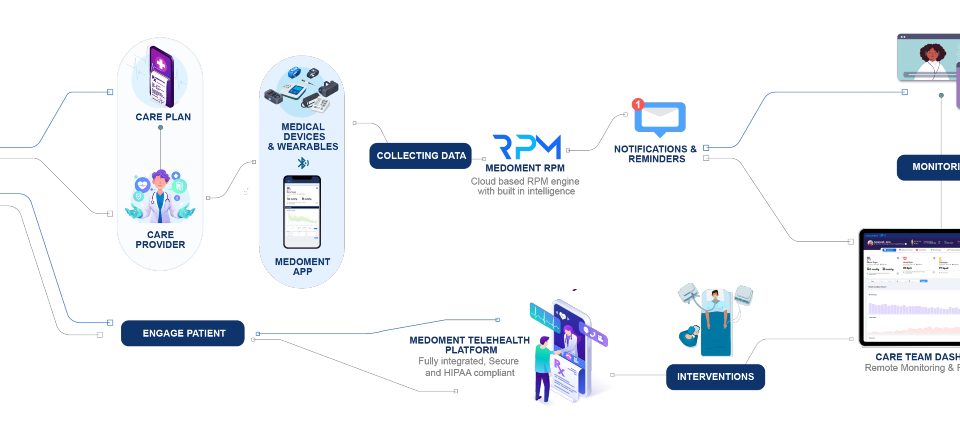
Growth of Telehealth in the MENA region
February 18, 2022
Medoment Partners with Mediflex to Revolutionise Healthcare in the Maldives
April 24, 2022The use of virtual methods of healthcare delivery, such as video consultations, is increasing. Telemedicine has been shown to offer potential benefits in many areas such as expanding access, enhancing communication and improving cost-efficiency.
But how does telemedicine compare to conventional methods of care for clinical outcomes and patient satisfaction?
Telemedicine is not suitable for all types of medical treatment and must be used judiciously, alongside in-person care. Patient safety and issues of data protection and security must always be considered.

How does telemedicine compare for clinical effectiveness?
Many studies have demonstrated either similar or improved clinical outcomes or effectiveness with the use of telemedicine, when used in the right context. Remote care has been shown to be particularly beneficial for monitoring chronic conditions and improving access in remote or under-resourced areas.
The current research evidence is mostly specific to particular specialities and more clinical effectiveness studies across a wider spectrum of clinical health services are needed.

Management of diabetes
An analysis of multiple studies found that telemedicine interventions are more effective than usual care, especially for type 2 diabetes. Another review found that telemedicine has the potential to improve clinical outcomes in patients with diabetes.
Management of Hypertension
Several randomised controlled trials have documented that the regular and prolonged use of blood pressure (BP) telemonitoring with telecounseling and case management under the supervision of a healthcare professional is associated with a significant BP reduction compared to usual care, particularly for high-risk patients.
Postoperative Care
Studies report comparable clinical outcomes for telemedicine as for traditional clinic follow-up. A trial including 200 general surgery patients found no difference in clinical results or number of visits between those randomised to outpatient clinic or telemedicine for follow-up.
Mental Health Care
Mental health consultations were the most common use of telehealth during the early stages of the COVID-19 pandemic. A review of telemedicine interventions to address maternal depression (MD) found significantly improved MD outcomes in 80% of studies. Telemedicine interventions significantly improved anxiety outcomes in 75% of studies that measured the outcome.
How does telemedicine compare for patient satisfaction?
A survey of telemedicine satisfaction in primary care found high levels of satisfaction with telemedicine visits. Factors more highly associated with satisfaction were saving more than 30 minutes of travel time, ease of connection, and video rather than telephone visits.
One study from New York City, during the COVID-19 pandemic, found that patient satisfaction with video visits was high and not a barrier toward a paradigm shift away from traditional in-person clinic visits.
A review of studies involving the use of telemedicine for postoperative care found that the majority of patients reported willingness to use telemedicine as they thought it would aid communication with their healthcare provider. Those who had previously used telemedicine reported high satisfaction and ease of use.
A systematic review of research into telemedicine use in haematology found that the vast majority of telemedicine interventions studied were shown to have a positive or neutral impact on patients and their families.
The advantages of telemedicine for mental health during the COVID-19 pandemic have been well documented. A survey in the USA found that 62% of patients receiving mental healthcare would prefer to conduct routine visits virtually, even after the pandemic has ended.
In conclusion
When used carefully and appropriately, telemedicine has great potential to improve both clinical outcomes and patient satisfaction in many areas of healthcare.
Are you looking for the ideal telemedicine solution for your healthcare practice?
Medoment is a new patient engagement portal that securely and seamlessly integrates all aspects of the care pathway, including telemedicine, compliant with the highest standards for data protection.
RECENT POSTS
- 7 Benefits of Medoment RPM for Your Practice
- Remote Patient Monitoring for Chronic Disease Management
- Can telemedicine help reduce the impact of cardiovascular diseases?
- Can telemedicine be used during pregnancy?
- Can Telemedicine Improve Diabetes Management?
- How to conduct a physical exam via telemedicine
- How can MEDOMENT Optimise Patient Engagement?
- Can patient engagement portals improve healthcare?
- How to choose the right telemedicine software partner
- How to invest in telemedicine software

